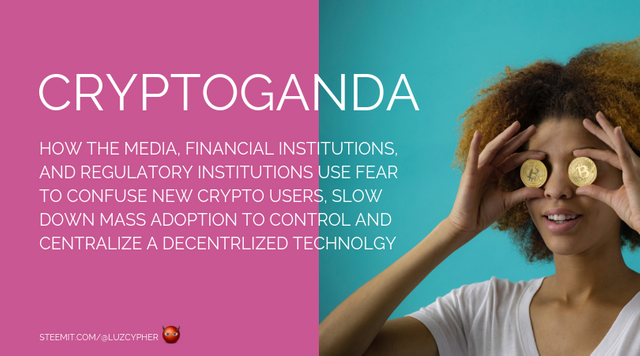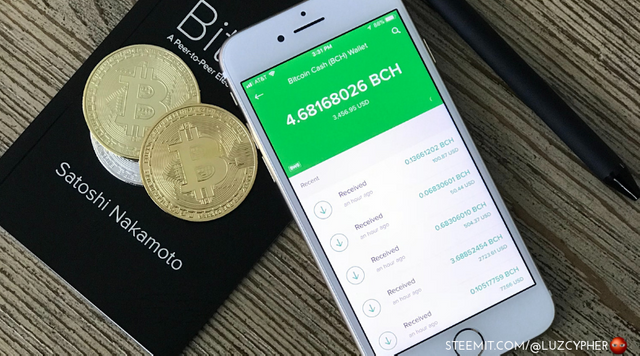Solutions To Bitcoin - Create A "Problem", Get A Reaction, Offer A Solution
The media has dragged Bitcoin's reputation through the mud, associating it with criminals, fraud, and terrorism. Wall Street executives have called it nothing but a scam or Ponzi scheme, yet now seem keen to open it to institutional investors. Is it really as bad as it's made out to be or is there another reason behind the years-long smear campaign perpetrated by the press?
Since its first genesis block was introduced on January 9th, 2009, Bitcoin has been proclaimed dead countless times but grows back like a weed stronger than it was before, as if it was impervious to negative attacks and determined to spread globally.
Blockchain, the technology behind Bitcoin, is resistant to central control by banks and regulatory institutions, making it an ideal protocol for a currency controlled by no one, for the people and with no custodian. In short, it makes it very disruptive.
Talking with uninformed people about the benefits of cryptocurrencies can sometimes be challenging. The reason is there has been a very strong campaign that coins like Bitcoin has been associated with many negative things and this is not a coincidence. This is exactly the response you see for any disruptive technology.
First of all, you have a technology that's different enough and difficult to understand and then you have that technology offending some of the well-entrenched organizations the technology disrupts.

FUD (Fear Uncertainty Doubt) Is Not New
The Red Flag Act passed in the United Kingdom in 1896 required every automobile to have an operator, engineer, and a conductor to operate an automobile. It also required a flagman running ahead of the vehicle waving a red flag to warn innocent, terrified pedestrians that an infernal death machine was barreling down the road trying to kill them.
This law, passed in England, to slowed the development of automobiles, was designed, funded, and lobbied for by companies with financial interests in horse and carriage businesses.
These types of strategies happen again and again throughout history whenever new disruptive technologies threaten the status quo. The initial response is part fear of change and partly engineered fear because of vested interests.
Looking back at articles written about the Internet in 1992-1994 expounding about how the internet was a den of thieves, pedophiles, criminals, and terrorists. Warnings told us if you let your children get onto the internet they would surely be destroyed and no one uses it except criminals.
They told us it had no practical use because we have fax machines and post offices that work perfectly fine. They also reported the phone companies were building a much better version of the internet, only without any of the open, borderless, content-creating innovation and freedom that the internet is, just closed, curated, editorially-controlled, safe, PG-13, appropriate for all audiences, and boring.
The same happened with other disruptive technologies like printing, electricity, cell phones, etc.
In the end, those engineered fear campaigns failed. They failed because what was exciting about the internet was it was open, decentralized, and borderless.
Criminals Use All Tools Available To Them
Did criminals use the internet? Yes, of course, they did. Just like they use automobiles, and electricity, and phones, and printing, and fiat cash. The bottom line is you don't make internet policy, or automobile policy or financial policy based on the narrow use of criminals using that technology. You look at the bigger picture of what happens if you give the tools of financial freedom to seven and half billion people.
That's terrifying to some. I don't care. I'm not going to try and sell this because Bitcoin is useful, solving real problems for real people.
Central banks and financial institutions who have a vested interest in keeping things the way they are, with them controlling the medium of exchange the population uses to conduct business, will sell the idea that it's dangerous to use. It's only used by criminals.

Bitcoin Bad Blockchain Good
They will also tell you that the underlying technology, the blockchain, is interesting, but bitcoin itself is too easy to manipulate, unstable, volatile, not scalable, hackable, but they have a better version that's safer to use and traceable so it won't be used by criminals.
Of course, it's going to be used by criminals because criminals run the banks. Criminals run governments. They are some of the biggest criminals out there and eventually, they're going to be using blockchain technology too.
I'm not interested in selling the idea to people because the banks and governments of the world will do that for me. What I'm interested in is educating people about the importance of decentralization and making sure they understand the difference of a decentralized digital asset as opposed to a centralized one and making it as useful to people as possible.
The rest will simply be washed away in history and one day our children will hear this completely fabricated story and the story will be that Satoshi Nakamoto invented blockchain and the world rejoiced and was never the same again.
Just as today when you ask school children who invented electricity or the automobile they will tell you Edison and Ford and everyone was happy, sparing you all the horror stories made popular during the time they were first invented. Of course, neither of those people actually created those things and some of the actual creators died poor, ridiculed, and destroyed, but we rewrite the history of those inventions later. And the world moves on.
The media and the vested financial interests of today will use the same fear tactics to slow down financial innovation as other industries used throughout history to position themselves to have control of the crypto markets.
How Will They Regulate What Is Not Regulatable?
Cryptocurrencies, by their very nature, are not easy for governments and central banks to control and regulate. The only weak points for them to do so is to target the exchanges, the points that act as on and off ramps for fiat and cryptos to merge. That's where you will hear endless media coverage of hacks and thieves stealing millions of dollars from accounts.
They will continue highlighting the threat in the media of terrorists using crypto and hackers stealing funds to instill fear in the population and move forward their agenda to regulate the industry to "protect us".
This type of dialog misses the entire point and undermines one of the biggest benefits of cryptocurrencies in the first place, the fact that it's decentralized, permissionless, free from politicians and governments inflating its value by printing more of it, and borderless. Basically, all of the things that make it disruptive and innovative.
Central banks, governments, and regulatory institutions want to instill fear in the population so they can offer a "solution" to these perceived threats with their own "safer" versions of the same thing by making it centralized and controlled, where they are positioned to grant you access and permission to use it with regulations like KYC laws. (Know Your Customer)

Be Your Own Custodian Of Your Funds
We don't need a central exchange to act as custodians for our funds. The whole point of holding your funds in a digital, decentralized form is to detach yourself from the need of central control of your funds. To convert it to fiat takes a few minutes. That's why when I use an exchange I'm in and out as quickly as possible, just long enough to turn it into fiat.
Holding your bitcoin in an exchange is no different to holding your money in a central bank and exposes your funds to hackers. Go in, do your business, and get out. If you need to hold crypto for extended periods of time do so in your own hard or cold wallet, not a wallet on an exchange or online.
Private keys stored on a wallet connected to the internet are vulnerable to network-based theft. These wallets are known as hot wallets. With a hot wallet, all the functions required to complete a transaction are made from a single online device. The wallet generates and stores private keys; digitally signs transactions using private keys; and broadcasts the signed transaction to the network. The problem is that once the signed transactions have been broadcasted online, an attacker crawling the networks may become privy to the private key which was used to sign the transaction.
Hard Wallet
A hardware wallet is a special type of bitcoin wallet which stores the user's private keys in a secure hardware device. source
To date there have been no verifiable incidents of Bitcoins stolen from hardware wallets. Hardware wallets are relatively new, but at least for the time being, they have maintained a good track record, unlike the numerous incidents of Bitcoin theft from Internet-connected computers.
However, it wouldn't surprise me at all, if hardware wallets come into popular use, to hear news of hardware wallets being hacked, with the aim of spreading fear to the point of people demanding an even safer solution.
Cold Wallet
Cold storage is an offline wallet provided for storing bitcoins. With cold storage, the digital wallet is stored on a platform that is not connected to the internet, thereby, protecting the wallet from unauthorized access, cyber hacks, and other vulnerabilities that a system connected to the internet is susceptible to. source
Cold storage resolves this issue by signing the transaction with the private keys in an offline environment. Any transaction initiated online is temporarily transferred to an offline wallet kept on a device such as a USB, CD, hard drive, paper, or offline computer, where it is then digitally signed before it is transmitted to the online network. Because the private key does not come into contact with a server connected online during the signing process, even if an online hacker comes across the transaction, s/he would not be able to access the private key used for it.

ETF's Exchange Traded Funds
An ETF, or exchange-traded fund, is a marketable security that tracks a stock index, a commodity, bonds, or a basket of assets. Although similar in many ways, ETFs differ from mutual funds because shares trade like a common stock on an exchange.
While most ETFs track stock indexes, there are also ETFs that invest in commodity markets, currencies, bonds, and other asset classes. Many ETFs also have options available for investors to use income, speculation, or hedging strategies. source
The SEC (Securities and Exchange Commission) is a U.S. government agency that oversees securities transactions, activities of financial professionals and mutual fund trading to prevent fraud and intentional deception.
Over the past year there has been much talk of creating ETF's for Bitcoin which would make it possible for large institutional investors to invest in "shares" of Bitcoin, news that has speculators drooling at the possibility of the price of bitcoin skyrocketing as billions of dollars flood into the crypto market.
For speculators this is seen as good news if it eventually happens, but the SEC has repeatedly been teasing they're ready to move forward only to backtrack once again and stall making a decision. Why is that?* What's holding them back?*
Cryptocurrency enthusiasts have been eagerly awaiting the approval of what would be the first-ever bitcoin exchange-traded fund, or ETF.
But the man largely behind greenlighting one — Securities and Exchange Commission Chairman Jay Clayton — has a few worries that need to be assuaged before he's "comfortable" approving the investment vehicle.
The first is a lack of market surveillance and the second is the issue of custody.
Custody Needs To Be 'Improved'
How to safely store these assets is a major roadblock. While bitcoin's price itself is certainly volatile, investors could also be exposed to a risk of theft in the underlying asset.
"We've seen some thefts around digital assets that make you scratch your head," Clayton told Silver Lake Partners Co-founder and North Island Chairman Glenn Hutchins, who moderated the panel. "We care that the assets underlying that ETF have good custody and that they're not going to disappear."
There are dozens of cryptocurrency custody solutions that have either been announced or are already on the market. Fidelity said in October that it was launching a separate company to handle cryptocurrency custody and trade execution for institutional investors.
Crypto companies Coinbase, Gemini, BitGo, Ledger and ItBit are among those already working on similar solutions. Japanese bank Nomura also announced plans in May to offer crypto custody, and Goldman Sachs and Northern Trust are reportedly exploring custodial services. But until Fidelity, there had been a noticeable lack of big U.S.-based incumbents officially entering the space.
Despite the options, Clayton said custody offerings still "need to be improved and hardened." source
All it takes to "improve and harden" custody is a hard wallet which leads me to believe the real reasons behind the SEC dragging their feet is they haven't figured out a way to control and centralize Bitcoin yet.
Why is the media and the SEC not educating people about this already established, proven method of personal custodianship for holding crypto? They don't want you o be your own bank. They don't want you to even realize that owning the actual asset and controlling your own private keys is what makes owning crypto so revolutionary to begin with. That's not part of the narrative.
Instead, they talk about speculative profits, ETF's, hackers, thieves, criminals, and the need for better custodians and regulations to hold your crypto for you. Basically, they want to make it just like a central bank again. It's no wonder that each time the markets are down there's a story about how Ripple did not go down.
Ripple is the second largest cryptocurrency by market cap after Bitcoin and calls itself decentralized, but is actually just central banks exchanging fiat currencies disguised as a crypto. They get the benefits of lower cost transactions but still retain full control. It's a blockchain for central banks.
The SEC acts like they haven't found a solution they are comfortable with or that is safe enough when we already have that solution. Hold your own coins in your own hardware or cold wallet and stay away from centralized solutions. They are not comfortable with that solution because they have no way to control it or regulate it.
The only available option left for central banks and regulators like the SEC to tempt you into giving your control of crypto over to them is to entice people with greed.
Regulators Regulate
Playing on the greed of speculators chomping at the bit for the SEC's approval may very well lead to investors accepting a compromise to give up decentralization in favor of making short-term profits.
The SEC keeps dangling the carrot of enormous profit potentials that institutional investment in crytpo-stocks would bring to the space while the media keeps stoking the fear of criminals and scammers taking advantage of retail investors to push the narrative for more control in hopes of gaining more control over a technology designed to put control in the hands of the people. The fact they're struggling to do so is a testament to the technology' resilience.
Because bitcoin is borderless, governments trying to regulate the space only serves to migrate crypto-related businesses and talent to jurisdictions more favorable to the technology. The more regulation they try to inflict on it the more it slips through their fingers, whereas the more friendly laws a nation passes involving crypto, the more innovation and talent they attract.
Personally, I would rather hold the actual asset, bitcoin, than a stock that represents the asset or derivative, however, a stock that represents a group of crypto assets, for example, the top 20 cryptocurrncies by market cap, is a stock I would probably buy just for fun.
What We Really Need For Mainstream Adoption
The good news is we already have the infrastructure needed and most of the heavy lifting in place in the form of the internet. The infrastructure we need to build is access to financial capabilities and the liquidity to make those viable. That means having enough people who have access to wallets that are decentralized, easy to use, easy to secure it, and easy to understand.
We need education for developers who are writing these applications and education for users and all of the things in place to smooth adoption. Right now Bitcoin is difficult to use, secure when online. We're still in the very early stages.
As more ease of use starts to grow and more people use it as a means of exchange it builds liquidity and liquidity allows more applications and more adoption and then the network effect kicks in.
That's what's required. We're not going to have to build physical infrastructure, we're going to need to build better and easier ways of getting on the network so that more people get on and we have the social and economic infrastructure. This is an economic tool and so having a robust economy with economic activity is the needed infrastructure for Bitcoin.
You'll know when we have it by this very simple test. You'll ask someone:
"How much is one Bitcoin?", and they will say, "What do you mean? It's one Bitcoin.
No, how much is it in dollars?
and they will say "One dollar is worth X numbers of Bitcoins."
That's when you know we've made the economic inversion.
How do you feel about the SEC and institutional investors entering the crypto markets? What do you think the implications will be? Do you see it as a good thing or bad thing for crypto?
All images in this post are royalty-free images from https://unsplash.com
Luzcypher's Announcement For Steem Witness


I love the "criminals use crypto" argument, because I'm always like, "Yeah, criminals use fiat. Are you giving up cash? How about Tide detergent, because they use that too, FFS!"
Criminals use credit cards, locksmiths, passports, the internet, phones, and bank accounts too. We're not giving them up anytime soon.
Good lord, I tried to explain to someone why I was investing in Steem the other week and ran into so many of the things you point out here. And damn if this post wouldn't have been helpful :))
Well, I don't know if it would've helped since some people seem content in the (mistaken) belief that they are informed enough. How can one be informed enough? Beyond me.
Anywho, I'm rambling. Masterful post, I'd make it a must-read for pretty much everyone.
Had me from there, to be honest.
Hahaha. Thanks for taking the time to read my post. It is so hard explaining cryto to noobs. Most people don't understand how fiat money works either. Talk about a scam.
Central banks run the biggest scam of all and have most people convinced it's legit. When you try to explain how it works to people they think you're crazy.
Brother thank you for this educational post, many people do not believe in cryptocurrencies but they are there in one way or another trying to undermine with the hope that this economic revolution will become the reason of the people to generate and manage your resources without intermediaries ... Thanks, Thanks!
Talking of Bitcoin for criminals?

Whats this then?
Central banks - the biggest criminals of them all.
For just one example,Wells Fargo's most recent scam they opened fake accounts under their customer's names and took their money.
What were the consequences of such a stunt? They just paid a fine, again. These are the same people we have "protecting" us from fraud? It's insane and no one went to jail or was held accountable.
Good read 👍
Posted using Partiko iOS
Almost all of the Worlds illegal Drug and Weapon deals are paid for in fiat currencies like the Dollar.
Cash leaves no trails and tells no tales.
I would venture to say most of the illegal transactions done in the world are paid for in government-backed fiat cash.
The old Hegelian Dialectic tactic to get things around to how they want it and demonise for the (sleeping coolie drinking) masses rejection off or acceptance off, good post @luzcypher
Hi @luzcypher!
Your post was upvoted by @steem-ua, new Steem dApp, using UserAuthority for algorithmic post curation!
Your UA account score is currently 6.677 which ranks you at #123 across all Steem accounts.
Your rank has not changed in the last three days.
In our last Algorithmic Curation Round, consisting of 230 contributions, your post is ranked at #60.
Evaluation of your UA score:
Feel free to join our @steem-ua Discord server